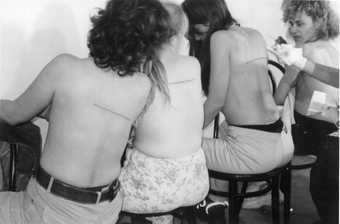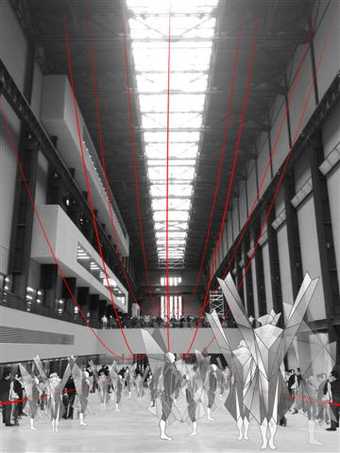How can performance shape our use and understanding of public space?
Who is represented through public performative events?
What does publicness mean in a global community?
The issue of publicness, particularly the discussion of how public space is constructed, used and understood, continues to be an area of growing interest. Theories and initiatives that aim to define the needs and parameters of 'the public realm' are developed by practitioners in numerous disciplines, such as those working with the built environment, social policy, psychology, community development and business management.
This second event in the Talks series explores the idea of how the public and institutions work together to create performative events. Drawing on Bojana Cvejić’s Spatial Confessions and Claire Tancons’ Up Hill Down Hall – An Indoor Carnival events, this discussion looks at some of the political aspects of public performance and how performance can engage diverse voices, often enabling under-represented views to come to light.
Join us to discover how engagement between the public and institutions often has unexpected outcomes and effects. Speakers include curator, writer and researcher Claire Tancons, political theorist Chantal Mouffe, Spanish artist Santiago Sierra, curator, Contemporary Art and Performance at Tate, Catherine Wood; and Professor of Contemporary Theatre and Performance at Queen Mary, University of London, Jen Harvie.
Biographies
Jen Harvie
Jen Harvie is Professor of Contemporary Theatre and Performance at Queen Mary, University of London, UK. She is author of Staging the UK and Theatre and the City, co-author of The Routledge Companion to Theatre and Performanceand co-editor of Making Contemporary Theatre: International Rehearsal Processes. Harvie’s most recent monograph Fair Play – Art, Performance and Neoliberalism, published by Palgrave Macmillan in August 2013, examines participation in contemporary art and performance to explore how its quality is affected by its relationships to work, cultural policy, urban space and capital. Harvie has previously participated in BMW Tate Live as a director of conversation with major feminist activists at Suzanne Lacy’s Silver Action in the Tanks at Tate Modern in February 2013.
Chantal Mouffe
A political theorist educated at the universities of Louva in, Paris, and Essex, Chantal Mouffe (b. 1943) is Professor of Political Theory at the University of Westminster. She has taught at many universities in Europe, North America and Latin America, and has held research positions at Harvard, Cornell, the University of California, the Institute for Advanced Study in Princeton, and the Centre National de la Recherche Scientifique in Paris. Between 1989 and 1995 she was Directrice de Programme at the College International de Philosophie in Paris. Professor Mouffe is the editor of Gramsci and Marxist Theory, Dimensions of Radical Democracy, Deconstruction and Pragmatism, and The Challenge of Carl Schmitt; co-author (with Ernesto Laclau) of Hegemony and Socialist Strategy: Towards a Radical Democratic Politics (1985); and author of The Return of the Political (1993), and The Democratic Paradox (2000). Her latest work is On the Political published by Routledge in 2005.
Santiago Sierra
Spanish artist Santiago Sierra (b. 1966, Madrid) addresses structures of power that operate in our everyday existence through his intervening work that exposes situations of exploitation and marginalisation; famously hiring underprivileged individuals who, in exchange for money, are willing to undertake pointless or unpleasant tasks. The essence of his work is in the tension generated and sustained between the event or its documentation and the spectator, who is exposed to a formal and poetic articulation of the voices of those who are normally marginalised or disenfranchised. Over the past twenty years, Santiago Sierra has exhibited widely in Europe and the Americas, and has been the subject of numerous solo presentations in museums and galleries, including Tate Modern; Mexico’s Museo Rufino Tamayo; Magasin 3 Konsthall in Stockholm; Hannover’s Kestnergesellschaft; Belgium’s Museum Dhondt-Dhaenens; the Kunsthaus Bregenz in Austria; the Kunsthalle Wein; Birmingham’s Ikon; and at Kunst Werke in Berlin. His work has garnered him international acclaim, and in 2003 he represented Spain at the 50th Venice Biennale.
Claire Tancons
Claire Tancons is a curator, writer and scholar based in New Orleanswhose work focuses on Carnival, public ceremonial culture, civic rituals and popular movements. Often curating for biennials (Prospect. 1 New Orleans, 7th Gwangju Biennale, CAPE09, Biennale Bénin, 7th Göteborg Biennial) Tancons has developed alternative genealogies and methodologies for thinking and presenting performance, including reclaiming the processional as a curatorial medium. She recently initiated a series of collaborations including Far Festa: Nuove Feste Veneziane (IUAV University and Bevilacqua La Masa Foundation, Venice, 2013), En Mas’: Carnival and Performance Art of the Caribbean (Contemporary Arts Center New Orleans and Independent Curators International, New Orleans, 2014-2015) and Psychic Pageant(New Orleans Airlift, New Orleans, 2014). Tancons received many grants from the Andy Warhol Foundation, the Prince Claus Fund and the Foundation for Arts Initiatives among others and, in 2012, an Emily Hall Tremaine Exhibition Award.


